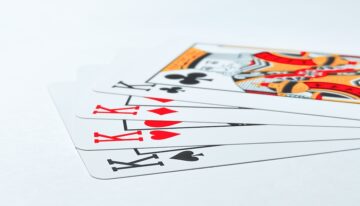
Why do we gamble? There is no one straight answer to that question. There are theories, sure. The leading theories all put it in the domain of dopamine, adrenaline rushes and such. There are also a number of social factors to it. But going into all of them in detail would take several tomes worth of studies, speculations, and arguments. The main thing, however, remains that few can overlook the almost irresistible charm of gambling. So much so that gambling has faced bans both from the state and the church (or similar religious bodies) throughout the ages. Is there good logic to such restrictions? Is gambling truly a ‘vice’?
To understand this, we must first look at the social image of the average gambler to the non-gambling people. It paints the gambler as a shady rogue in a scarcely lit tavern. This is essentially a medieval image – times when gambling houses actually started becoming commonplace. We have gambled for millenia now : whether through dice games in those gambling houses, or through betting on blood sports. In those times, gambling truly was an ‘underground’ activity. But the image of a streetwise rascal in the seedy establishment still translated well to the modern casino. Many of the early big-time casino owners in L.A. – like Benny Binion – had close associations with the crime. And this is where most of the stigma about gambling and casinos come from.
Unlike the Scorsese flicks, most casinos today do not have any ties to the underworld or the mafia. Needless to say, the ‘average gambler’ is a stereotype. Like with any group of people, gamblers are rather a spectrum. But generally, there tend to be three kinds of gambling.
Social Gambling
In the beginning, gambling, started as a community activity. To this day, this culture still holds in casinos. Many who attend casinos do so as a retreat with friends – both for the young and for the old. After all, casinos are indeed a chill place to hang out. Sometimes with performing bands and complimentary drinks to boot, if the casino is high-profile enough. ‘Social gambling’ as a technical term, on the other hand, has nothing to do with the casino crowd.
On the contrary, social gambling is the more private form of gambling that involves social interactions – usually online. It is an ingenious hybrid of social media and gambling. For example, there are ‘social casinos’, i.e. apps where you can play the casino games like blackjack, baccarat, or video poker with your friends. The definition of ‘social gambling’ is therefore rather broad. In fact, gaming commissions in different countries may define them differently. On the whole, social gambling tends to be more legal in many countries where traditional gambling faces bigger restrictions.
Casual and Pathological Gambling
As you can tell, there is no difference between ‘casual gambling’ and social gambling. A social game with gambling mechanics will likely intend to fulfil the role of a casual game between friends. Instead, an easier definition of ‘casual’ is in opposition to pathological gambling. We have previously mentioned that gambling is intricately related to both conscious and unconscious forces. Whatever spurs you to seek out risks and gamble will give you commensurate thrill when you get rewards for it. Like most reward-related behaviors, this also is a release of dopamine. Once you get used to that connection, it is very easy to develop a gambling addiction. Pathological gambling is succumbing to this addiction.
But we all find some extent of fun in gambling. Even casual gambling has no point if you do not find the exercise rewarding. So where exactly do you draw the line? Like with other addictions, you know you have a ‘gambling problem’ when it starts to adversely affect your daily life. Also like other addictions, gambling also has withdrawal symptoms when you try to quit. A very harsh truth is that a pathological gambler is a gold mine for casinos. All gambling houses, in the end, are out there to make money. It is therefore in their interests to rope you in by making the process inherently as addictive as possible. A gambling problem is bad news. As a dope fiend would sacrifice anything for a hit of their poison, a pathological gambler will bankrupt themselves and drown in debt just to sustain the gambling habit.
Thankfully, there are many ways to treat gambling addiction. In fact, most cases of pathological gambling only need the jolt of a reality check. Most pathological gamblers do not easily realize that they have developed an obsessive disorder around gambling. There are, of course, rehab passages like twelve-step programmes or cognitive behavior therapy, should one need it.
Register with JeetWin today and play amazing online casino games and win fabulous prizes!
- addiction
- All
- apps
- arguments
- around
- bankrupt
- Bans
- Betting
- blood
- cases
- Casino
- Casinos
- church
- cognitive
- community
- countries
- Crime
- Culture
- day
- Debt
- detail
- develop
- disorder
- Early
- Exercise
- faces
- First
- First Look
- form
- fun
- Gambling
- game
- Games
- gaming
- Gold
- good
- Group
- houses
- HTTPS
- Hybrid
- image
- IT
- leading
- Legal
- Line
- Making
- Media
- money
- news
- online
- opposition
- Other
- owners
- People
- poison
- private
- Reality
- rehab
- Rewards
- So
- Social
- social media
- Sports
- started
- State
- studies
- Technical
- therapy
- treat
- Video
- WHO
- win
- worth











